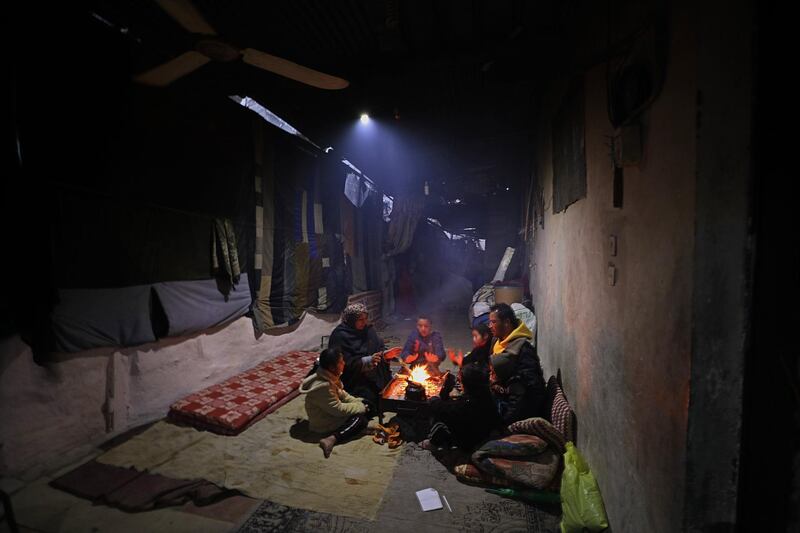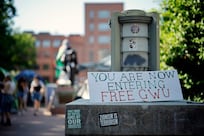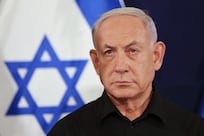As it was being assembled a year ago, the Donald Trump administration announced it was making Israeli-Palestinian peace-making ("the deal of the century") a priority to be led by presidential son-in-law and senior adviser Jared Kushner.
The new American team was entirely inexperienced and almost entirely ideologically aligned with the Israeli far right. However, it was argued, given the track-record of "experts" in the Bill Clinton, George W Bush and Barack Obama administrations, why not try novices who might deploy “fresh thinking” and Mr Trump's supposed "art of the deal?” How much worse could things get? Clearly, the answer is: much.
In their own ways, all three of Mr Trump's predecessors did significant damage to prospects for peace. For example, Mr Obama's well-intentioned but misguided and mishandled demand for a comprehensive Israeli settlement freeze, which was eventually simply abandoned, put the already moribund Oslo process into indefinite hibernation.
In early November, Mr Trump's team announced that, after ten long months of intensive study, the new administration was beginning to craft its own peace plan. Who needs a full year?
Since then, things have gone so badly we may never get a look at the presumably masterful breakthroughs being concocted by Mr Trump and Mr Kushner. What better way, after all, to kick off a peace initiative than by upending the final status issues structure and making, to no identifiable purpose, the most provocative move on Jerusalem since Israel's purported annexation in 1980?
It’s hard to imagine anything that could more comprehensively foreclose progress and poison the atmosphere. The Trump team either didn’t know, or, worse, didn’t care about this inevitable impact.
Palestinian president Mahmoud Abbas responded with a counterproductive and damaging speech before the Palestinian Central Committee. Perhaps Palestinian fortunes have, by now, sunk so low that Mr Abbas felt he had little to lose diplomatically. He certainly felt compelled to shore up his domestic political position by articulating outrage.
But, at a minimum, his remarks exacerbated tensions. They will probably exact a significant cost without any national benefit to Palestinians. An indication of by whom and how that price will be paid comes as Washington has cut its annual support for UN services to Palestinian refugees by half.
Mr Abbas did not carefully explain how and why the Palestinians feel betrayed by Washington prejudicing a core final status issue, which is an important case that has yet to be carefully made to the international audience. Nor did he articulate the Palestinian national experience and yearning in a positive, proactive way. Astoundingly, after all their decades of struggle, such a defining Palestinian vision articulated at a major national forum remains undelivered.
________________________
Read more from Opinion
Zahra Lari Arab sportswomen like me are the role models for the next generation
Toby Harward Sustainable energy can improve the lives of the world's most vulnerable inhabitants
Con Coughlin Credit Trump with the thawing of Pyongyang's relations with Seoul
________________________
Instead, Mr Abbas presented a history and anatomy of Zionism that wasn't just hostile, but calculated to cause maximum offense to Jewish Israelis. Much of it was nonsense. Some of it was certainly true. None of it, however, was wise, useful or constructive.
Everyone should be grateful to Mr Abbas for continuing to stand against physical violence. But there was a hint of epistemological violence to his angry characterisation of Israel as a colonial and imperialist plot wholly disconnected from Jewish identity, and, essentially, a political and psychological pathology.
Given their history of dispossession and occupation, Palestinians have ample grounds for outrage. The occupation is a reality of intensive, daily violence and abuse. But anger is not only no strategy. When it dominates national politics and policy it is a surefire recipe for failure and defeat.
Benjamin Netanyahu's smug response that Mr Abbas's diatribe against the Israeli narrative "serves our political goals more than anything else" may be true in a very limited and immediate sense.
Yet Israel controls millions of Palestinians in a system that, with any honesty, can only be compared to apartheid. Israel now is neither majority-Jewish nor meaningfully democratic. And it has no idea whatsoever how to resolve that.
Palestinians basically know what they want, in both minimal and maximal versions. But they have absolutely no idea how to achieve it, or even how to move forward. Israelis are charging ahead, but without any consensus vision for the future.
For now, Mr Abbas and the Palestinian Authority will undoubtedly continue to limp along, mainly because everyone, including Israel, the Palestinians and the United States, needs them to. But the principal national goal they are serving is staving off the disaster of Hamas primacy.
Meanwhile, the Trump administration continues to make a grim situation worse.
Indications that Washington plans to re-designate its consulate in West Jerusalem as an embassy sometime this year reveals no learning from the uproar over the Jerusalem statement and no sense of proportion or responsibility in the handling of this highly sensitive issue.
And Mr Netanyahu continues to lead Israel squarely into an entirely unmanageable future of unavoidable, endless and intensifying conflict.
Ultimately, something dramatic will shatter this impasse and it may well be disastrous for all concerned. Not all parties are equally powerful, but all current leaderships are culpable.
The “professionals,” frankly, have been bad enough. The last thing this delicate and dangerous situation needed was enthusiastic amateurs.
Hussein Ibish is a senior resident scholar at the Arab Gulf States Institute in Washington, DC





